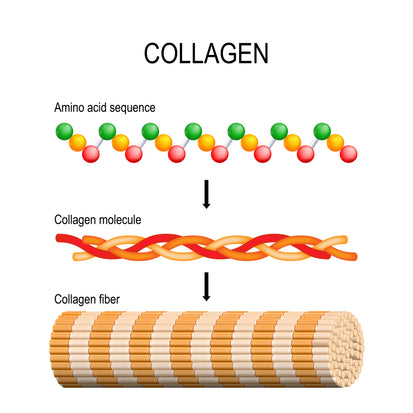Amino acids in collagen
A healthy body needs the building blocks to function properly. Two essential elements that play an important role in the health of our skin, bones, and joints are amino acids and collagen.


What are amino acids?
Amino acids form the basis of proteins, the essential macromolecules in our bodies. Of the 20 amino acids, nine are essential amino acids that we must get through food because our bodies cannot make them themselves. The remaining 11 amino acids can be synthesized by the body.
The functions of amino acids are diverse. They are involved in building, repairing, and maintaining tissues, and play a crucial role in the production of enzymes, hormones, and neurotransmitters. In addition, amino acids are important for the immune system and contribute to our body's energy supply.
Amino acids have important functions in:
- The production of strong connective tissue
- Wound healing
- Storage and transportation of nutrients
- Production of new cells
- Energy production
- Building the muscles
- Healthy bones
In total, there are 22 essential amino acids that are vital for the functioning of our body. These amino acids can be divided into three different categories:
- Non-essential amino acids are those that the body can naturally produce. They are synthesized without the need to get them directly from our diet.
- Semi-essential amino acids are amino acids that our bodies can normally produce, but sometimes not in sufficient quantities to meet our needs. This deficiency can occur with medical conditions or after intense physical activity, such as heavy athletic training.
- Essential amino acids are the amino acids that our bodies cannot make themselves. We must obtain them through our diet or supplemental supplements to ensure that we get them in sufficient amounts.

Amino acid deficiency
Amino acids are naturally present in your skin and are essential for healthy skin. They provide hydration and make your skin supple and resilient. As building blocks of proteins and peptides, they help your skin's natural defense system, protect it and reduce signs of skin aging.
In some cases, your body may have an extra need for amino acids. This occurs when you:
- are trying to lose weight
- doing intense sports
- suffer from sleep problems
- suffer from a cold sore
Losing weight
Weight loss occurs when you consume fewer calories than you consume. A smart way to support this is by adding protein-rich foods with amino acids, as this makes you feel satiated faster. Moreover, protein and amino acids help maintain muscle mass while losing weight.
But there's more: amino acids also play a crucial role in the production of the body's own growth hormones, which in turn contribute to fat burning. Thus, amino acids can be a valuable ally on your path to a healthier weight.
Intensive exercise
When you are actively engaged in strength training or endurance sports, your body has an increased need for amino acids. Fortunately, you can easily meet this need with a healthy and varied diet. However, for some athletes, it may be helpful to supplement their intake of amino acids with protein shakes and BCAAs, which stands for "branded chain amino acids. BCAAs contain the three essential amino acids: leucine, isoleucine and valine. These amino acids play an important role in building and repairing muscle tissue, so they can contribute to faster recovery after intense athletic performance. As a supplement to a balanced diet, BCAA supplements can help athletes get the most out of their training and improve their performance.
Sleep problems
If you often have trouble falling asleep, one possible cause could be a deficiency in amino acids. In fact, amino acids play an important role in your sleep. The amino acid tryptophan is essential for the production of melatonin, the hormone that stimulates your body to go to sleep. In addition, glutamine can contribute to rest because it helps reduce stress and restlessness. If you suspect your sleep problems are caused by an amino acid deficiency, it could possibly be due to the following factors:
- Insufficient amino acids in your diet
- Consumption of many fructose-rich foods, which binds tryptophan to fructose, reducing melatonin production. Fructose and glucose are particularly present in sweet convenience foods.
- Not optimal functioning of your gastrointestinal system, which can lead to poor absorption of amino acids. Digestion ensures that foreign substances, including amino acids, are converted into useful substances. For example, if you are deficient in stomach acid, this can result in a deficiency of amino acids.
If you suspect an amino acid deficiency is causing your sleep problems, it is advisable to evaluate your diet and nutrition. In some cases, supplementing amino acids in your diet or improving your digestive health can help improve your sleep. It is always wise to seek advice from a health professional if you experience persistent sleep problems.
Cold sores
In addition to its role in the production of collagen and strengthening connective tissue, lysine is also important in the production of antibodies. These antiviral properties make lysine a valuable tool in the fight against a cold sore, for example. By using lysine, you can prevent and treat a cold sore.
Amino acids in food

Your body can obtain essential amino acids, which it cannot make itself, by consuming enough protein from various food sources. To get all the essential amino acids, it is important to follow a varied diet because different protein sources contain different amino acids. For example, legumes are rich in lysine but poor in methionine, while grains have just the opposite pattern. It is possible to obtain sufficient amino acids from both animal sources and plant sources. However, animal sources often generally contain more amino acids than plant sources.
Amino acids can also be obtained from supplements.

Collagen
Collagen is the most abundant protein in our bodies and plays a vital role in maintaining the structure and strength of various tissues. It provides support and elasticity to the skin, bones, tendons, cartilage, and blood vessels.
Collagen consists mainly of the amino acids glycine, proline, and hydroxyproline. These amino acids form a unique triple helix structure that determines the strength and stability of collagen. As we age, the natural production of collagen decreases, which can lead to signs of aging, such as wrinkles, stiff joints, and thinning hair.
To stimulate collagen production, it is important to follow a healthy diet rich in protein, vitamin C, and other nutrients needed for collagen synthesis.
Collagen supplements can be used to stimulate collagen production. The Anti-Aging Beauty Collagen Complex is a powdered beauty supplement containing 5000 mg VERISOL® Bioactive Collagen Peptides, 100 mg Vitamin C, 120 mg Hyaluronic Acid, 10 mg Zinc and 1 mg Biotin. It conditions and rejuvenates the skin from the inside out. It also contributes to beautiful hair and nails.
When the Collagen Complex is taken, the amino acids are broken down, allowing them to be absorbed by the body. This can potentially help promote healthy skin, joints, and bones.
Anti-Aging Beauty Collagen Complex
Amino acids in the Beauty Collagen Complex
Collagen type 1 is the most abundant type of collagen in the human body and is mainly found in skin, bones, tendons, ligaments, and teeth. The amino acid composition of collagen type 1 consists mainly of the following amino acids:
Conclusion: the connection between Amino Acids and Collagen
Amino acids and collagen work closely together to support our body's health. The amino acids from our diet serve as building blocks for the synthesis of collagen in our bodies. Thus, to make new collagen, you need amino acids.

